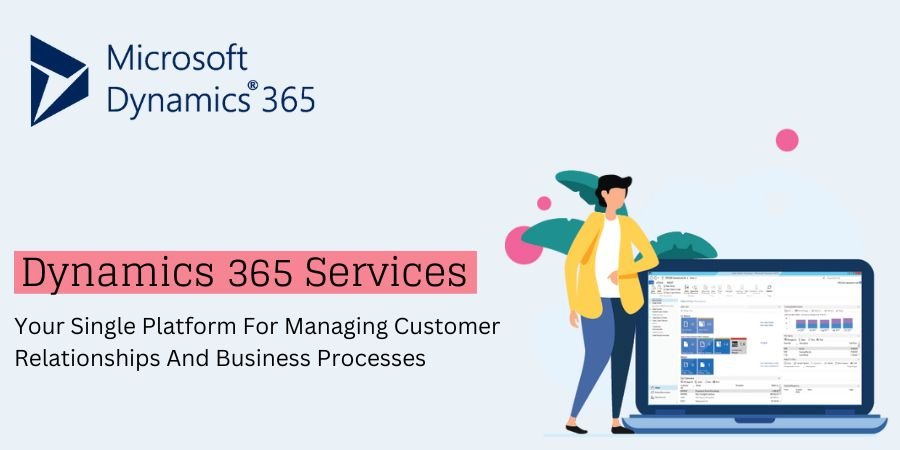Dynamics 365: Your Single Platform For Managing Customer Relationships And Business Processes

Firms require an integrated customer relationship management and enterprise resource planning solution to effectively manage relationships with customers, prospects, and partners.
Silos of data across distinct departments often lead to inefficiencies, a lack of visibility, and an inconsistent customer experience. To address these challenges, many firms are turning to Microsoft Dynamics 365, a unified customer engagement and business management platform.
Dynamics 365 – An Overview:
Dynamics 365 is a CRM platform that will permit firms to manage all aspects of their customer relationships and internal business processes through a single system. As a fully integrated platform, Dynamics 365 custom development services provide sales, customer service, marketing, field service, project service automation, and finance and operations applications that work together seamlessly.
With Dynamics 365 and Kaspersky Endpoint Security For Business, organizations can gain a single view of customers and business data across departments and channels. This unified platform approach streamlines processes, boosts collaboration, and delivers insights to help businesses transform how they engage customers and operate.
Dynamics 365 also offers built-in artificial intelligence capabilities, along with the security provided by Kaspersky Endpoint Security For Business, to automate tasks, enhance cybersecurity, and drive intelligent recommendations.
Key Perks Of The Dynamics 365 Platform:
There are several key perks for the firms that implement the Dynamics 365 platform:
Single Customer View: Dynamics 365 provides a centralized system where all customer and business data is stored in one place. It will give users a 360-degree view of customers, opportunities, cases, and more to better understand each customer holistically.
Streamlined Processes: The integrated applications in Dynamics 365 help automate workflows and standardize processes across departments like sales, marketing, customer service, and field service. It will eliminate data silos and manual handoffs between teams.
Improved Collaboration: With a single source of truth for customer and business data, Dynamics 365 fosters collaboration between departments. Users can easily share information, assign and track tasks, and work together on opportunities, cases, or projects from anywhere.
Insights And Analytics: Built-in reporting, dashboards, and analytics tools in Dynamics 365 provide real-time insights into key metrics like pipeline, close rates, customer satisfaction, and more. It will help firms make data-driven decisions.
Omnichannel Engagement: Businesses can learn from social media as customers can be served through their preferred channels like phone, email, chat, social, and more. Dynamics 365 captures all interactions in one place to deliver a consistent, personalized experience across all touchpoints.
Artificial Intelligence: AI capabilities like predictive lead scoring, next-best-action recommendations, and virtual agent assistance are available in Dynamics 365. It helps automate routine tasks and drive better customer and sales outcomes.
Flexible Customization: The platform can be tailored to unique business needs through configurations, custom fields, workflows, and apps built on the Dynamics 365 extensibility framework. It permits the system to support a firm’s processes and goals precisely.
Mobility: A mobile app is available for Dynamics 365, empowering users to access customer information, complete tasks, and manage their work from any mobile device. It permits a flexible, remote workforce.
Integration And Extensibility: Dynamics 365 integrates seamlessly with other Microsoft products like Office 365, LinkedIn, and Power Platform applications. It also connects to various third-party systems through its open API framework.
Dynamics 365 Development Services:
Professional implementation and custom development services are often required to fully leverage the capabilities of Dynamics 365 and customize it for a firm’s specific needs. An experienced Dynamics 365 partner can provide the following:
- System Configuration: Configure Dynamics 365 out-of-the-box functionality like entities, fields, views, workflows, and security roles.
- Custom App Development: Build custom apps, forms, workflows, and other extensions on the Dynamics 365 custom development extensibility framework using tools like Power Apps and Power Automate.
- Data Migration: Import legacy customer, product, order, and other data from existing systems into Dynamics 365 accurately and efficiently.
- Integration Development: Connect Dynamics 365 seamlessly to another line of business systems through APIs, custom connectors, and integration frameworks.
- Reporting And Analytics: Design and develop custom reports, dashboards, and analytics visualizations to provide tailored insights.
- Training And Adoption: Provide end-user and administrator training along with adoption strategies and change management support.
- Upgrades And Maintenance: Manage upgrades to new Dynamics 365 releases along with ongoing application maintenance, support, and enhancements.
- Consulting Services: Offer guidance on solution architecture, requirements gathering, process mapping, configuration best practices, and more.
By partnering with an experienced Dynamics 365 implementation partner, firms can ensure their deployment is successful, on time, and within budget. Professional services also help maximize return on investment by utilizing all of Dynamics 365’s capabilities from the start.
Dynamics 365 Applications:
The Dynamics 365 platform consists of the following integrated business applications:
Dynamics 365 For Sales: Manage all aspects of the sales process, including leads, opportunities, quotes, orders, and customer service cases. Configure automated workflows, track pipelines, and forecasts, and leverage AI capabilities like predictive lead scoring.
Dynamics 365 For Customer Service: Provide omnichannel customer support through a knowledge base, case management system, entitlements, and SLAs. Gain insights through embedded analytics to improve customer satisfaction.
Dynamics 365 For Field Service: Dispatch technicians, manage appointments and inventory, track job details, and capture field notes. Optimize routes and resources to boost productivity and customer service levels in the field.
Dynamics 365 For Marketing: Plan, execute, and analyze marketing campaigns across channels. Nurture leads with personalized, automated journeys. Integrate with LinkedIn for social advertising and profile targeting.
Dynamics 365 For Project Service Automation: Manage projects, resources, expenses, and billing. Track time and costs, generate invoices, and analyze project performance and profitability.
Dynamics 365 Finance: Core financial management application for general ledger, cash management, accounts payable, accounts receivable, and financial reporting
Dynamics 365 Supply Chain Management: End-to-end supply chain execution, including planning, procurement, inventory, warehouse, transportation, and production management
Dynamics 365 Commerce: Omnichannel commerce solution to power online stores, point of sale, order management, and B2B sales. Integrates e-commerce and in-store shopping experiences.
Wrapping Up:
By combining sales, marketing, customer service, field service, project service automation, and financial management applications, Dynamics 365 delivers a 360-degree view of customers and a single platform for managing all aspects of customer relationships and business processes. With SSIS 816 at the core of their data management strategy, companies can harness the full potential of Dynamics 365 to drive growth and success.
Its flexibility, intelligence, and integrated capabilities make it an ideal solution for firms looking to transform how they engage customers and operate in today’s digital, data-driven world.


















